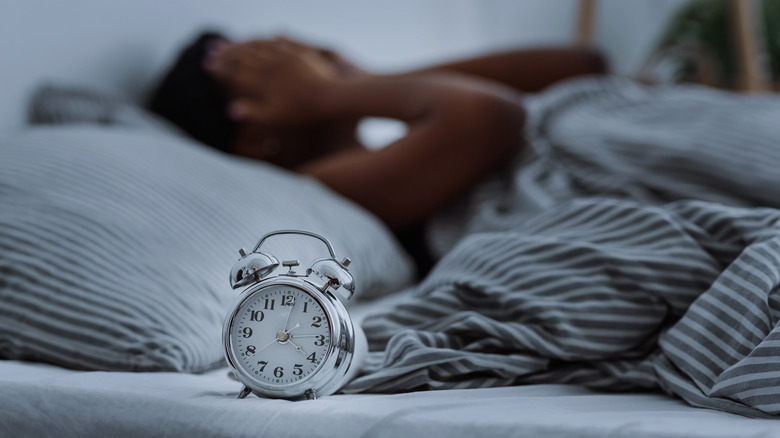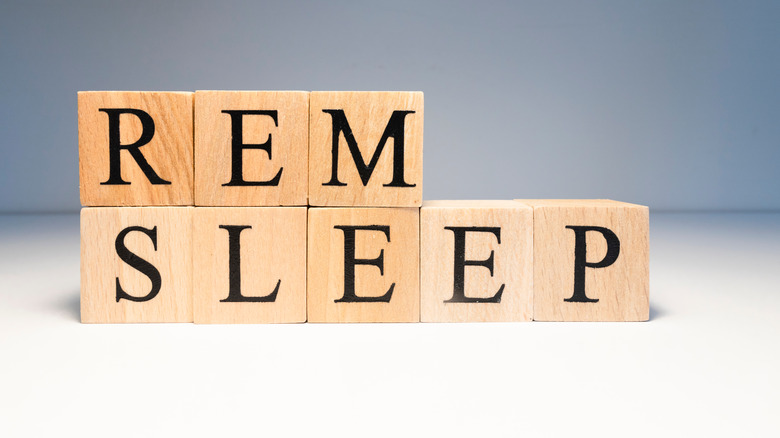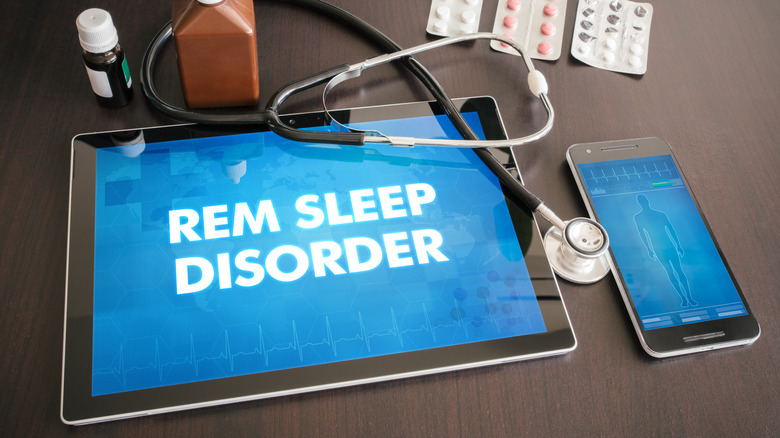At-Home Tips To Help With REM Sleep Behavior Disorder
Sleep does so much more than just help you recharge when you're tired. According to the Cleveland Clinic, sleep is also essential for memory, mood, and growth (which is why children sleep longer and deeper than adults). It can even keep you healthy — research shows people with poor sleeping habits are more likely to develop heart problems and diabetes.
When you sleep, your brain and body go through cycles of REM (rapid eye movement) and non-REM sleep, per Cleveland Clinic. Brain activity increases during REM sleep, which is why you have your most intense, memorable dreams during this period of time. To keep you from acting out those dreams, major muscles (including arms and legs) become paralyzed.
Disturbances in REM sleep can create a number of issues, some more serious and unusual than others. For example, according to the Sleep Foundation, less than 1% of the population suffers from something called REM Sleep Behavior Disorder, a disorder in which the temporary muscle paralysis during REM sleep doesn't happen.
As a result, people with REM sleep behavior disorder act out their dreams physically. They might kick, punch, jump, or scream while sleeping. They might also fall off the bed or injure themselves (or others) by bumping into furniture or grabbing dangerous objects (per Mayo Clinic).
Lifestyle adjustments to consider
While experts aren't sure what causes REM sleep disorder, some things seem to trigger more frequent episodes. The Sleep Foundation recommends establishing good sleeping habits (such as making sure you get plenty of good quality sleep on a schedule) as part of your treatment. Certain medications and regular use of alcohol or drugs can make the condition worse, so it's worth discussing your lifestyle with your doctor to see if something can be changed or adjusted.
If you sleep with a partner, the Mayo Clinic suggests it might be a good idea to have them move out to a different room for a while to prevent injuries. There are both prescription medications and supplements (like melatonin) available to help with REM sleep behavior, and sometimes the symptoms can be reduced enough so that it will be safe for your partner to return to the same bedroom, per The Sleep Foundation. If your bedroom is not on the ground floor, it might be a good idea to sleep downstairs for a while. While not everybody with this condition experiences sleepwalking, it could be safer in order to avoid the possibility of falling.
Create a safe bedroom environment
The Sleep Foundation estimates that up to 81% of those suffering from RBD are injured at one time or another as a direct cause of the condition — sometimes with injuries as serious as head trauma and fractures. Many of those injuries happen when falling off the bed. To avoid injury, put the mattress directly on the floor or place padding (cushions or an air mattress) next to the bed. Padded bed rails could also help by keeping you safely in bed.
Next, do a walkthrough of the bedroom and remove sharp objects or anything that could be used as a weapon. Use foam or other soft coverings to pad the sharp corners of furniture. Lock closets and use child locks on drawers to prevent access to potentially dangerous things inside.
The American Academy of Sleep Medicine (AASM) recommends blocking or securing windows. It's also a good idea to keep your bed away from windows and to move furniture and objects away from where you sleep — hard edges can be dangerous if you hit them while getting off the bed.
If you find yourself getting injured regularly, the AASM recommends trying a sleeping bag to keep yourself contained. In a 2011 study published in the Journal of Clinical Sleep Medicine, experts found that a "bed alarm" (a recorded message in a calming familiar voice that was triggered when the person left the bed) proved effective in preventing injury once people with RBD got out of bed.



